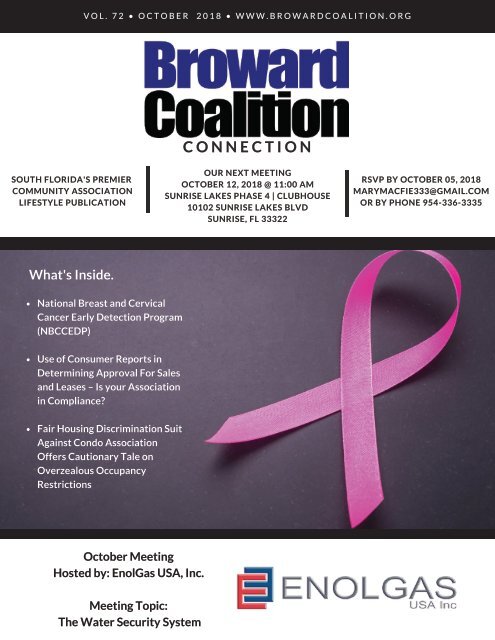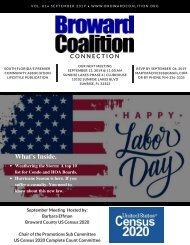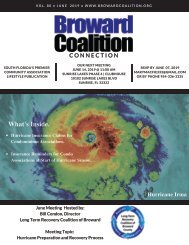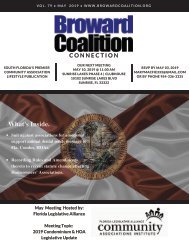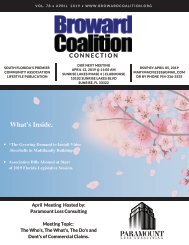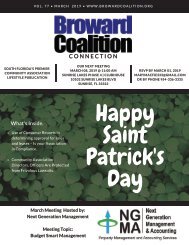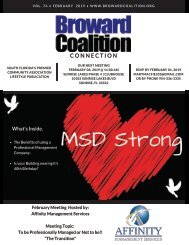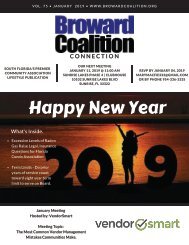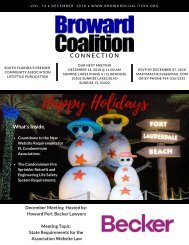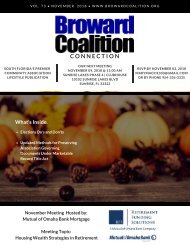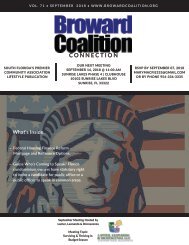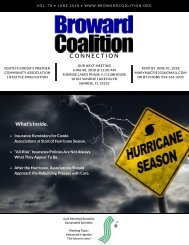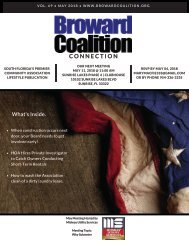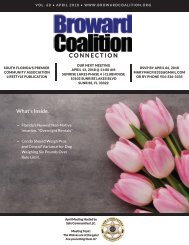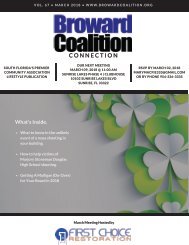October 2018 Newsletter
Create successful ePaper yourself
Turn your PDF publications into a flip-book with our unique Google optimized e-Paper software.
V O L . 7 2 • O C T O B E R<br />
2 0 1 8 • W W W . B R O W A R D C O A L I T I O N . O R G<br />
SOUTH FLORIDA'S PREMIER<br />
COMMUNITY ASSOCIATION<br />
LIFESTYLE PUBLICATION<br />
C O N N E C T I O N<br />
OUR NEXT MEETING<br />
OCTOBER 12, <strong>2018</strong> @ 11:00 AM<br />
SUNRISE LAKES PHASE 4 | CLUBHOUSE<br />
10102 SUNRISE LAKES BLVD<br />
SUNRISE, FL 33322<br />
RSVP BY OCTOBER 05, <strong>2018</strong><br />
MARYMACFIE333@GMAIL.COM<br />
OR BY PHONE 954-336-3335<br />
What's Inside.<br />
National Breast and Cervical<br />
Cancer Early Detection Program<br />
(NBCCEDP)<br />
Use of Consumer Reports in<br />
Determining Approval For Sales<br />
and Leases – Is your Association<br />
in Compliance?<br />
Fair Housing Discrimination Suit<br />
Against Condo Association<br />
Offers Cautionary Tale on<br />
Overzealous Occupancy<br />
Restrictions<br />
<strong>October</strong> Meeting<br />
Hosted by: EnolGas USA, Inc.<br />
Meeting Topic:<br />
The Water Security System<br />
1
The WATER SECURITY SYSTEM (WSS)<br />
is a smart system is specifically designed<br />
to protect high-rise residential<br />
buildings from water damage.<br />
Each system is customized to<br />
meet the needs of the building.<br />
The WATER SECURITY SYSTEM will provide the following benefits:<br />
• A Lifetime of Technical Support<br />
• Outstanding service before, during and after the installation is complete.<br />
• It is not necessary to place sensors all over an apartment or in breaks in the walls to detect<br />
leaks because the Water Security System monitors the flow of water from the main water<br />
supply to the apartment and will detect leaks without the need for sensors.<br />
• Built in Water Meter provides the ability to measure the water usage for each apartment and<br />
create monthly bills by apartment for water usage at the touch the touch of a button.<br />
• Water Conservation is achieved by being able to monitor the water usage by apartment, detect<br />
hidden leaks & leaky toilet flappers and to promote an awareness of the system throughout the<br />
building.<br />
• Property Manager Dashboard which is designed to monitor the water usage for each apartment.<br />
• Battery Life indicated on the Property Manager Dashboard with notification when the batteries<br />
need to be changed. Life span is about 2 years and they are standard triple-A (“AAA”) batteries.<br />
• Automatic Shut-off Valve with Water Meter which monitors the flow of water into each<br />
apartment and will automatically shut off the domestic water in the event there is a leak.<br />
• Cloud-Storage of Water Usage Data with the ability to provide monthly water bills by<br />
apartment at the touch of a button<br />
• Leak Warning and Drip Warning Notifications by text and email<br />
• 5 Year Warranty on the Entire System. This can be extended to 8 years with the use of the<br />
cloud for data storage.<br />
• Unlimited number of sensors per apartment<br />
• Communication through WIFI Signal or the Mesh Network. We will customize the system to<br />
meet the needs of your building.<br />
• 0% Financing.<br />
GET A FREE SURVEY FOR YOUR WATER SECURITY SYSTEM<br />
754-205-7902 (Office) • 954-687-5252 (Cellular) 2 • www.watersecuritysystem.com
3
561-693-3160<br />
www.citiquiethurricanewindows.com<br />
4
National Breast and Cervical Cancer<br />
Early Detection Program (NBCCEDP)<br />
By: CDC – Division of Cancer Prevention & Control<br />
What Services Does the NBCCEDP Provide?<br />
Local NBCCEDP programs offer the following services for eligible women—<br />
• Clinical breast examinations.<br />
• Mammograms.<br />
• Pap tests.<br />
• Pelvic examinations.<br />
• Human papillomavirus (HPV) tests.<br />
• Diagnostic testing if results are abnormal.<br />
• Referrals to treatment.<br />
s<br />
Who Should Get Breast and Cervical Cancer Screenings?<br />
All women are at risk for breast and cervical cancer, but regular screenings<br />
can prevent these diseases or find them early. The U.S. Preventive Services<br />
Task Force has established the following guidelines for screening, but<br />
you should talk with your health care provider how often you should get<br />
screened.<br />
• Breast cancer: Women between 50 and 74 years old should get a mammogram<br />
every two years. Those under 50 should talk with their provider<br />
about when they should be screened.<br />
• Cervical cancer: Women should get their first Pap test at age 21 and<br />
continue screening until age 65.<br />
Are You Eligible for Free or Low-Cost Screenings?<br />
You may be eligible for free or low-cost screenings if you meet these<br />
qualifications—<br />
• You are between 40 and 64 years of age for breast cancer screening.<br />
• You are between 21 and 64 years of age for cervical cancer screening.<br />
• You have no insurance, or your insurance does not cover screening exams.<br />
• Your yearly income is at or below 250% of the federal poverty level.<br />
s<br />
CDC’s National Breast and Cervical Cancer Early Detection Program<br />
(NBCCEDP) provides breast and cervical cancer screenings and diagnostic<br />
services to low-income, uninsured, and underinsured women across the<br />
United States.<br />
Breast and Cervical Cancer Early Detection Program<br />
Bureau of Chronic Disease Prevention<br />
Florida Department of Health<br />
4052 Bald Cypress Way, Bin #A-18<br />
Tallahassee, FL 32399-1744<br />
1 (800) 227-2345 • (850) 245-4444<br />
Fax: (850) 414-6625<br />
5<br />
s
6
Use of Consumer Reports in Determining Approval For Sales and Leases<br />
– Is your Association in Compliance?<br />
By: Jeffrey A. Rembaum, Esq<br />
Community associations have an interest in the safety and integrity<br />
of their communities. Generally speaking, boards of community associations<br />
would like to be reasonably certain that potential owners, renters and<br />
other occupants have the financial capability to meet their financial<br />
obligations. Also of concern are potential purchasers’ and tenants’ criminal<br />
backgrounds, if any, so as to avoid endangering the overall safety and<br />
welfare of the community.<br />
To address these concerns, many associations have purchaser and<br />
tenant approval procedures set out in their governing documents, usually<br />
the declaration, which often authorize the association to obtain “consumer<br />
information reports” on all applicants as part of the screening process.<br />
This leads to the question of when and how a community association<br />
can utilize a background check that includes both a credit report and<br />
criminal history.<br />
The first step is to determine if the governing documents provide<br />
for the approval process. The second step is to ensure there is meaningful<br />
criteria by which to evaluate the results of the consumer information<br />
report. The consumer information report (a/k/a the background check)<br />
is typically compiled by a consumer reporting agency or company, which<br />
is engaged in the business of gathering credit scores, reports on previous<br />
rental history, criminal background information, employer history, and<br />
verification of income amongst other information. The consumer information<br />
report cannot be used for any other purpose other than for the<br />
determination of approval. Importantly, it cannot be used in a discriminatory<br />
manner to reject housing based on race, color, religion, national<br />
origin, sex, disability, or familial status.<br />
If the community association makes an unfavorable determination<br />
on the applicant’s status based on information contained in the consumer<br />
report, then the association MUST provide certain information to the<br />
applicant pursuant to the terms of the Federal Fair Credit Reporting Act.<br />
1. The association must provide the applicant verbal or written notice<br />
that the applicant was denied based on the information supplied in the<br />
consumer report.<br />
2. The verbal or written notice of adverse determination must include:<br />
a) the name, address, and phone number of<br />
the consumer reporting company that supplied the report,<br />
b) a statement that the company that supplied the report did not<br />
make the decision for the unfavorable action and cannot give reasons for<br />
the denial;<br />
c) a notice of the applicant’s right to dispute the accuracy and<br />
completeness of the information in the credit report and that the applicant<br />
may request a free report from the credit reporting company within 60<br />
days.<br />
For the protection of the association, this notification should always<br />
be done in writing so as to provide proof positive of compliance with<br />
the Fair Credit Reporting Act. Additionally, there are local Broward<br />
and Miami-Dade County Ordinances requiring that a written notice be<br />
mailed to the rejected applicant which provides with some degree of<br />
specificity the basis for the disapproval, in addition to the notice required<br />
by the Federal Fair Credit Reporting Act.<br />
The information that the association relied on in making the adverse<br />
determination CANNOT be released to the applicant, but the applicant<br />
may request from the credit reporting agency to see the information in the<br />
consumer information report and correct any inaccurate information. Even<br />
if the information provided a small role in the total determination of the<br />
application, the applicant must be provided the required notice by the<br />
association.<br />
What is to be done with the consumer information report after a<br />
decision has been made? The general rule is that all information in the<br />
consumer report must be destroyed in such a manner that it cannot be<br />
reconstructed. But arguably, Florida law requires community associations<br />
to keep such records, as all written records of an association must generally<br />
be kept for seven years. Therefore, the association will want to<br />
store the consumer report in the applicant’s file, which will need to be<br />
designated as confidential with restricted access. It is NOT part of the<br />
official records open to inspection and, thus, not available upon a request<br />
to inspect the association’s official records.<br />
If a declaration has general language providing for the purchaser<br />
and tenant approval but does not provide the standards and procedures<br />
necessary to make such a decision, then on all likelihood the association’s<br />
approval is on thin ice and subject to challenge. This is a good time to<br />
check your declaration and seek advice from the association’s lawyer as to<br />
whether your association’s declaration approval process needs to be updated.<br />
7
8
Fair Housing Discrimination Suit Against Condo Association<br />
Offers Cautionary Tale on Overzealous Occupancy Restrictions<br />
by Michael E. Chapnick<br />
Condominium Association Boards of Directors are always considering<br />
measures to help maintain and enhance the quality of life of<br />
their community’s owners and residents. Some associations grow<br />
concerned about too many occupants per unit and the burden that<br />
additional residents place on a community’s amenities and services,<br />
so they decide to implement occupancy restrictions in order to limit the<br />
number of people residing in each unit.<br />
However, as a Palm Beach County condominium recently found<br />
out, overly aggressive occupancy restrictions have the potential to<br />
run afoul of the Federal Fair Housing Act bans on discriminatory housing<br />
practices against couples with children, and nonprofit housing<br />
agencies are willing and able to take up the case of aggrieved residents<br />
or proposed residents.<br />
A fair housing advocacy group called the Fair Housing Center of<br />
the Greater Palm Beaches filed suit in federal court recently against<br />
the condominium association for the Fontana Condominium in Palm<br />
Beach as well as its president and property manager. The suit alleges<br />
that the defendants have discriminated against families, including<br />
those with minor children, by enacting and enforcing policies that<br />
limit the number of persons and children who may reside in the community’s<br />
units. It is seeking preliminary and injunctive relief as well<br />
as damages for the alleged discrimination against familial status in<br />
housing that violates the Fair Housing Act and the Civil Rights Act<br />
of 1968. The suit also seeks punitive damages, attorneys’ fees and a<br />
court order mandating that the defendants establish a victims’ fund<br />
for those were victimized by their discrimination.<br />
The suit alleges that in 2010 the condominium community<br />
adopted a two-person maximum occupancy restriction for all of its<br />
units, which each have two bedrooms. It states that the occupancy<br />
policy of the U.S. Department of Housing and Urban Development<br />
adopted in 1998 holds that two occupants per bedroom is deemed<br />
to be reasonable under the Fair Housing Act. The suit also alleges<br />
that the two-person limit imposed by the condominium violates the<br />
local occupancy code in Palm Beach County, and the policy resulted<br />
in familial status discrimination when it was used to deny the tenancy<br />
of a couple with their infant child.<br />
9<br />
From a cursory review of the 16-page complaint, the plaintiffs<br />
appear to have a strong case against the association and its management,<br />
which will likely incur significant expenses in their defense.<br />
The end result will be a significant amount of legal and financial<br />
hardships for the community, all of which it may have been able to<br />
avoid by first consulting with highly qualified and experienced legal<br />
counsel prior to implementing the two-person occupancy restriction<br />
for its two-bedroom residences.<br />
Condominium associations in Florida and across the country<br />
should take note of this case, as it illustrates the potential pitfalls<br />
that can come as result of overzealous occupancy restrictions.
The Theatre at<br />
Sunrise Lakes Phase 4<br />
Diane DeNoble<br />
and<br />
Bob Diverde<br />
<strong>October</strong> 6, <strong>2018</strong><br />
8:00 PM<br />
Alexandra Marie<br />
and<br />
Rodrigo Aragon<br />
<strong>October</strong> 20, <strong>2018</strong><br />
8:00 PM<br />
Get Your Tickets Today!<br />
Low Price $8.00 - Including Coffee & Cake<br />
Call: 954-748-3230 Ext. 1<br />
Box Office Hours: Mon-Fri. 9:00am - 2:00pm<br />
Wednesday Hours: 9:00am - 8:00pm<br />
For More information<br />
emai: marian@sunriselakesphase 4.org<br />
10<br />
The Theater at<br />
Sunrise Lakes 4<br />
10102 Sunrise Lakes Blvd.<br />
Sunrise, Florida 33322
You’re only as<br />
good as the<br />
counsel you keep.<br />
Legal Counsel to Community Associations Since 1977<br />
Offices in Miami-Dade, Broward and Palm Beach<br />
Main Office: Suntrust Plaza, 201 Alhambra Circle, Suite 1100, Coral Gables, FL 33134<br />
800-737-1390 | www.srhl-law.com<br />
11
PRESRT STD<br />
US Postage<br />
PAID<br />
Ft. Lauderdale FL<br />
Permit # 2727<br />
PO Box 452874<br />
Fort Lauderdale, FL<br />
33345-2874<br />
Dedicated to the Representation of Community Associations<br />
Free CEU Courses & Seminars for<br />
Community Association Board Members & Licensed CAMs<br />
REGISTER NOW!<br />
Palm Beach County Expo<br />
Palm Beach Convention Center<br />
Tuesday, <strong>October</strong> 2<br />
Covenant Enforcement: 10-11 a.m.<br />
2019 Legal Update 2:30-4:30 p.m.<br />
Broward County Expo<br />
Broward County Convention Center<br />
Thursday, <strong>October</strong> 4<br />
Covenant Enforcement: 10-11 a.m.<br />
2019 Legal Update: 2:30-4:30 p.m.<br />
Miami-Dade County Expo<br />
James L. Knight Convention Center<br />
Tuesday, <strong>October</strong> 9<br />
2019 Legal Update: 2:30-4:30 p.m.<br />
BROWARD COUNTY<br />
1200 Park Central Blvd. South, Pompano Beach<br />
RSVP required: seminars@KBRLegal.com or 954.928.0680<br />
Jumping Into the Present: Why Updating the<br />
Governing Documents of Your Association Is<br />
Critically Important<br />
Provider #: 0005092 • Course #: 9628058<br />
Tuesday, <strong>October</strong> 16 • 6:30 p.m. to 7:30 p.m.<br />
One (1) OPP or ELE Credit is provided.<br />
Guest Restrictions & Screening Tenants and New<br />
Owners: Is It Worthwhile?<br />
Provider #: 0005092 • Course #: 9628051<br />
Tuesday, <strong>October</strong> 23 • 6:30 p.m. to 7:30 p.m.<br />
One (1) HR or ELE Credit is provided.<br />
“Ask the Experts” on WWNN 1470 AM and on 93.5 FM<br />
Join Robert Kaye and Michael Bender on the first Thursday of<br />
each month, from 5 p.m. to 6 p.m.<br />
Call in with your pressing association law questions to 888.565.1470. Also available<br />
on KBRLegal.com, iHeart Radio, YouTube and U Stream.<br />
PALM BEACH COUNTY<br />
9121 North Military Trail, Suite 200, Palm Beach Gardens<br />
RSVP required: trisha@KBRLegal.com or 561.241.4462<br />
Homeowners Association<br />
Board Member Certification Course<br />
Provider #: 0005092 • Course #: 9627379<br />
Wednesday, <strong>October</strong> 10 • 6:00 p.m. to 8:30 p.m.<br />
Two (2) IFM or ELE Credits are provided.<br />
Condominium Association<br />
Board Member Certification Course<br />
Provider #: 0005092 • Course #: 9626451<br />
Wednesday, <strong>October</strong> 17 • 6:00 p.m. to 8:30 p.m.<br />
Two (2) IFM or ELE Credits are provided.<br />
2019 Legal Update<br />
Provider #: 0005092 • Course #: 9629127<br />
Wednesday, <strong>October</strong> 24 • 6:00 p.m. - 8:30 p.m.<br />
Two (2) Legal Update (LU) Credits are provided.<br />
Broward Office: 1200 Park Central South Blvd. | Pompano Beach, FL. 33064 | 954.928.0680<br />
Palm Beach Office: 9121 North Military Trail, Suite 200 | Palm Beach Gardens, FL. 33410 | 561.241.4462<br />
Info@KBRLegal.com KBRLegal.com<br />
The hiring of a lawyer is an important decision that should not be based solely upon advertisements. Before you decide, ask us to send you free written information about our qualifications and experience.<br />
12


